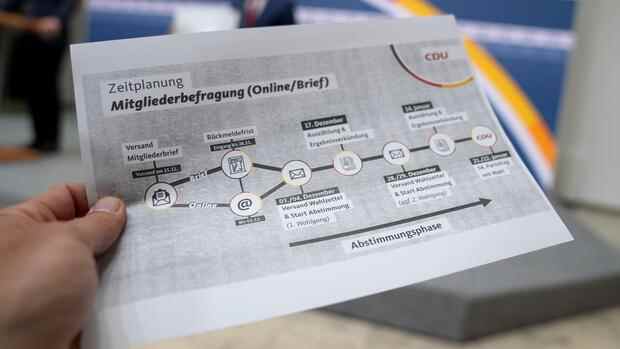Only members of the CDU are entitled to vote – as of November 24th, 6 p.m. That is how long there is time to become a member and support the preferred candidate. However, if you want to vote by letter, you have to be a member of the party by November 8th. The central member file is read out on this key date.
All other new members vote online. In the party headquarters it was said that since the member survey was in prospect as a procedure, the entries into the party were “significantly higher than the weekly average in the past”. Exact numbers were not given. In the party, however, it was said that the candidates would certainly advertise their supporters to join the party – according to the motto: “Your vote can be the decisive one.”
Top jobs of the day
Find the best jobs now and
be notified by email.
Who proposes the candidates?
The right to propose lies with the party organizations, for example the district, district or state associations. The CDU federal associations are also allowed to nominate candidates. This can be, for example, the senior citizens’ union, the medium-sized and economic union or the Christian-democratic workforce. The Protestant working group as well as the party’s federal committee can submit a proposal.
Who is running?
Officially, applicants can register from November 6th. One thing is certain: you have to be a member of the CDU. There are no candidatures yet.
Are there already candidates?
Not yet officially. But there have been discussions for a long time above all five candidates, all of whom are men, Catholic and from North Rhine-Westphalia: the chairman of the parliamentary group, Ralph Brinkhaus; Vice-parliamentary group and head of the Economic Union, Carsten Linnemann; the former parliamentary group leader and Vice President of the Economic Council of the CDU, Friedrich Merz; the foreign politician Norbert Röttgen as well as CDU Vice and Federal Health Minister Jens Spahn. Behind the scenes, it was said, team solutions were being worked on intensively. Merz and Linnemann could run for candidates together, and Röttgen should also be on the lookout. He wants a woman on the team.
Would double leadership be possible?
There was this debate in the party, but both the district chairmen and the federal executive committee rejected it. The party’s statutes do not provide for the division of labor at the top.
Will there be an election campaign?
How the candidates advertise themselves is up to them. It is possible to present themselves at state party conferences or on the boards of the associations, and the branches can organize events themselves. There should be no votes with any recommendations. The party itself will present the candidates on the website. In addition, the party offers “digital formats”, such as discussion rounds with the respective candidates.
Is there a quorum?
“The vote of the member survey is valid regardless of participation rates,” it says in the rules of procedure. The question that remains open, however, is whether the delegates to the federal party congress feel bound by the vote if the turnout is low.
What’s the schedule?
The proposals for candidates must be received by the federal office between November 6th and November 17th at 6 p.m. The electoral board, consisting of five people who are determined by the federal board, then examines the proposals and will announce them “immediately after the application deadline and admission” on the CDU homepage and by email to the members.
The introductory phase is scheduled from November 18th to December 2nd. This is followed by the first ballot, by letter and online, which will last from December 4th to 16th. The result will be announced on December 17th. The victorious candidate needs an absolute majority.
If a runoff election is necessary, it will last from December 28th to January 13th. The result will be announced the following day. On 21/22 On January 1st, 1001 delegates are to formally confirm the victorious candidate by election at the 34th federal party conference of the CDU in Germany and thus enthrone him as the successor to Armin Laschet.
It would be the third chairman within three years. The formal confirmation of the vote of the members is necessary because the statutes of the CDU do not provide for a membership decision and this should remain a one-off process.
Is the member survey a done deal?
No, because the process costs the party a lot of money, from 1.3 to 1.5 million euros is the talk. For example, all around 400,000 members must be written to. The party’s “Rules of Procedure for Conducting a Membership Survey” therefore states: “The procedure will be carried out if at least two candidates take part in the survey.”
More: Armin Laschet takes responsibility for election debacles – and shows the way out of the crisis
